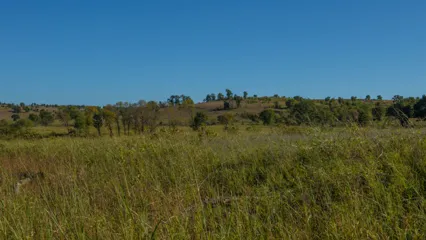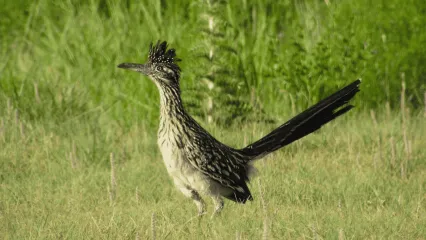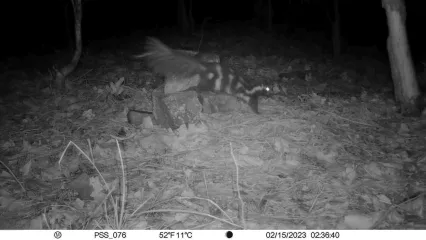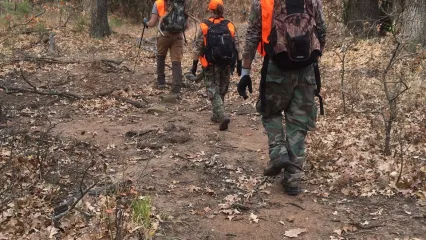Attention Non-Residents
The Oklahoma Wildlife Conservation Commission adopted new rules in 2025 that require non-residents accessing certain Oklahoma public hunting and fishing areas to check in and out of the area. By checking in and out of these areas, hunters, anglers, shooters, birdwatchers, hikers and any other users can help the Wildlife Department better understand how the area is being used. There is no additional cost associated with checking in or out of an area. There is no limit to the number of check ins for an individual in a year.

Contacts
Area Details
Osage WMA - Western Wall Unit covers 7,329 acres of Osage County in northeast Oklahoma. The Osage WMA also includes the Rock Creek Unit (3,722 acres).
Osage WMA is a mixture of cross-timbers, tall grass prairie, and river bottom habitats.
Bottomland habitats occur along the Rock Creek, Pond Creek, and Mud Creek drainages. Upland sites are a mixture of tall grass prairie and post oak-blackjack ridges. The average annual precipitation for the area is about 40 inches.
Going Quail Hunting?
During quail hunting season, wing collection boxes are placed at several wildlife management areas: Beaver River, Optima, Osage, Packsaddle, Cooper, Kaw, Drummond Flats, Canton, Fort Supply, Cross Timbers, and Pushmataha. Hunters are asked to donate a wing from each quail they harvest for research purposes. Ultimately, the wings can help determine the status of the quail populations at the WMAs and can offer clues about how next year’s season might pan out.
Western Wall Unit
From Pawhuska: 12 miles north on State Hwy 99, 4 miles west on CR4151, follow the signs.
- Quail: Bobwhite quail are present in fair numbers.
- Deer: White-tailed deer present in fair numbers.
- Turkey: Rio Grande turkeys are present in fair numbers.
- Rabbit: Cottontail are found in fair numbers.
- Furbearers: Coyote, bobcat, raccoon, beaver and fox are found in fair numbers.
- Dove: Limited dove hunting opportunities due to the lack of agricultural fields.
- Waterfowl: Very limited opportunity on small ponds or creeks.
- Squirrel: Fair hunting opportunities for both Fox and Gray squirrels.
- Greater Prairie Chicken: Present in low numbers, closed season.
- Bald Eagle: Eagles are occasionally seen in the winter months.
Approximately 25 acres are planted annually to cool season grasses and legumes. Controlled cattle grazing and prescribed fire are utilized to manipulate habitat on about 9,500 acres and about 50 acres of openings are created and maintained with herbicide, tree shear, or mowing.
One primitive camp ground is located on the Rock Creek unit. Camping is not permitted on the Western Wall unit.
Some fishing opportunities exist in creeks and small ponds.
Area closed to all activities for controlled deer hunts:
Nov. 7-11, 2025
Nov. 14-18, 2025
Nov. 21-25, 2025
Unless otherwise provided, firearms are restricted to shotguns with pellets and rimfire only.
Closed Seasons
Same As Statewide Seasons
Seasons w/ Special Restrictions
- Dove, Rail, Gallinule, Crow, Duck, Merganser and Coot, Predator/Furbearer Calling, Trapping
Closed from the opening day of deer archery season through deer gun season.
- Quail, Snipe, Woodcock, Rabbit, Squirrel
Closed from the opening day of deer archery season through the first nine days of deer gun season.
- Pursuit with Hounds for Furbearers
Closed from the opening day of deer archery season through deer gun season and closed during spring turkey season.
- Turkey Spring, Youth Turkey Spring
One-tom limit; seasons combined.
Closed to all nonhunting activities from Oct. 1 - Jan. 31 and during spring turkey season.
No camping allowed.
Oklahoma Tourism and Recreation Department
Post Office Box 52002
Oklahoma City, OK 73152-2002
(800) 652-6552 or (405) 521-2409
www.travelok.com
Bartlesville Area Convention and Visitors Bureau
201 SW Keeler
PO Box 2366, Bartlesville OK 74005
918-336-8708
1-877-273-2004
For One Survey Team, “Getting Skunked” Smells Like Success
Getting skunks on camera was a critical first step in an Oklahoma State University survey team’s effort to learn more about the Plains spotted skunk population in southeastern Oklahoma. The secretive and little-known skunk was detected at about half of the survey sites on the Ouachita National Forest.
Apprentice Designation: A Learner's Permit for Hunting
Hunter education has greatly reduced hunting accidents, but if you can’t complete a course right away, the apprentice designation allows you to hunt under supervision. It works like a learner’s permit, giving you the chance to gain real experience safely until you finish hunter education.



